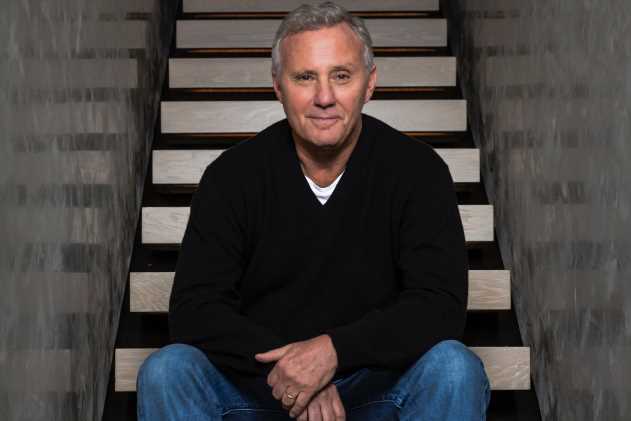
Ian Schrager Talks Public Relaunch, Work-Life Boundaries and Broadway Show
06/08/2021Gearing up for the official relaunch of his Public hotel and the return of New York City’s economic engine, Ian Schrager believes egalitarianism can help cure not all ills, but some crucial ones.
Through his alliance with Marriott and his design company, his stylistic and business choices influence — knowingly or not — thousands of travelers and locals each year. Reached Monday morning in the Hamptons, where he has been primarily “on Zoom all day” and ensconced with his family for the past 15-plus months, Schrager zeroed in on a few of the current cultural shifts.
He would know. Decades after Schrager and Steve Rubell created boundary-breaking Studio 54, the nightclub lives on as a backdrop in the Netflix series “Halston.” In that age of all-nighters, hundreds lined the streets en masse to try to get past the velvet ropes for entrance. The hotelier also created the directional and formerly celebrity-centric Morgans Hotel and the Royalton. Now Schrager is taking a more all-are-welcome approach with Public’s “Luxury for All” concept and next week’s unveiling of its Popular restaurant.
Fifteen percent of New York City’s hotels are not expected to reopen but “nobody really knows,” Schrager said. “We never have gone through anything like this. We went through big scares. In the ’90s, we went through a bad recession and a bad hit with that Resolution Trust [Corp.] that they formed [as a temporary federal agency to resolve the savings and loans crisis of the ’80s]. New York went through near bankruptcy in the ’70s and the Great Depression in the ’20s,” he said. “We’ve gone through ups and downs, but nothing was as profound and long-lasting as this one was.”

Related Gallery
Chloe Resort 2022
He continued, “But I do think, and I have always thought, we will go back to the way we were before. Because we always forget the bad and only remember the good. We have always done that since the flood with Noah. I really mean that.”
Schrager, whose portfolio includes the Times Square Edition, is banking on business to get going by September. This summer’s restaurant and bar business are expected to be about 70 percent of normal figures, due partially to post-COVID-19 safety guidelines. Hotel reservations will be lower than that benchmark, since corporate, group and international travelers have not yet returned in force.
Here, Schrager talks about his new Public, why hip is no longer relevant — and how he wishes Lin-Manuel Miranda would direct a Broadway show based on Studio 54.
WWD: Has the pandemic reminded you of the AIDS epidemic?
Ian Schrager: Yes, of all the human calamities that I’ve gone through, the only one that felt like this was AIDS. Nobody knew what was going on. Nobody knew how you got it. Nobody knew that you could die from it [initially]. You had a pit in your stomach. You didn’t know who was dropping next. You were losing friends left and right. And those friends, by the way, were of the cultural zeitgeist.
WWD: During the past 16 months, a lot of people said that quarantine felt like prison. As someone who has been in prison [for corporate tax evasion], how do you respond to that?
I.S.: There is nothing like prison. Hopefully, nobody has to go through that. You lose your human dignity and the discretion that humans exercise, which separates us from all the other living beings on this planet. I would rather be locked up in a hotel for a year and getting room service. Quarantine was isolating. The optimistic people took advantage of the time off to recalibrate, rethink, make improvements to themselves and decide what was important to them. The pessimistic people thought they were in jail, I suppose.
WWD: Isn’t prison where you and Steve [Rubell] developed a plan for your first hotel?
I.S.: Exactly. When I was in jail, I read David Halberstam’s book, “The Best and the Brightest.” It was a watershed moment for me. He was tracing the lives of the media empires in this country. All of them had a forced interlude or an interlude by the war. I had a forced interlude.
WWD: Some post-pandemic forecasts call for a Roaring Twenties outlook? Where do you stand with that?
I.S.: I think that is going to happen. You can’t overthink it. In 1918 and 1919, people had just come back from a war. We really don’t know what impact that had on people’s desire to go crazy and celebrate a return to normalcy. I can tell by the little bit that I’ve seen and felt, people are ready to go mad. Reservations for the hotel and restaurants are jammed already. People are going to events whether it is out here [in the Hamptons] or in the city. We are a species. We’re social. People want to socialize and go back to their normal way of living. That’s an understatement. I think there will be a fast economic recovery. I don’t have data. That’s just instinctive. People will also be tentative. We in business have to be sensitive and respectful of that, and to the people, who have lost their lives. We have to be a little measured. Usually, I open up a hotel like “The Day of the Locust.” I don’t think that is appropriate now. We have to change our playbook.
WWD: Why did you decide to do ‘Luxury for All?’
I.S.: Terence Conran did that with furniture. He took the pretension out of it. Andy Warhol did that with art. I don’t think that was his intention but he did. Luxury should be available to anybody, who wants it. And it’s not about being rich, wearing the right brand, or where you live. That is a medieval approach to luxury. I believe in making luxury available to everybody who wants it and getting rid of the telltale outdated criteria. It’s a modern idea, egalitarian and just so appropriate to the times. Somebody today just asked me who are my customers. I always say the same thing. Mick Jagger, who is almost 78. I’m 74. Miley Cyrus is 28. They’re all customers…it’s having reasonably priced things but not dumbing it down. Making it aim high and be sophisticated for people to enjoy. It’s not only the bargain hunters that want that. The rich people want that, too.
WWD: How is your idea of luxury different than anyone else’s?
I.S.: Everyone is clinging to the old idea of luxury. [High society’s capacity of] 400 started with Mrs. [the grandmother of Vincent] Astor, because she could only fit 400 people in her ballroom. Rich people had historically been celebrities or influencers. That’s gone through many iterations — movie stars, athletes, musicians, artists, media personalities. Now we’ve ended up upside down with celebrities being celebrities before they even accomplish anything, like the Kardashians. Now that old criteria doesn’t matter anymore. What matters is being able to feel good, comfortable and having the freedom of time and no hassles.
WWD: Is the idea of hip gone?
I.S.: Yup. It’s more important to be smart than to be hip. We used to be dominated by a really bohemian class. Everyone, who wanted to try do something that hadn’t been done before, rolled into New York City. There was a diversity. That’s when the city was the most fun. A lot of the bohemians came out of fashion. They were our movie stars in the ’70s. They were the most sought-after cover to get. Halston and Calvin Klein were our ultimate celebrities, when American fashion was coming into its own and was considered on par with Europe. New York doesn’t have that deep element anymore of nobody-has-anything-to-lose-so-let’s-try-anything. Now it’s just occupied by a bunch of rich people and hedge fund people. It’s no good. This Luxury for All is a response to all that is going on.
WWD: Do you mean the social justice movement and the pandemic?
I.S.: That’s part of it. You have to ask yourself why we have had the strongest economy that we have had in a very long time yet half the population is pissed off. We have to take care of the people who are left behind or that’s going to be a problem for us…making luxury available to everyone isn’t just the right thing to do. It has nothing to do with race, creed, color or age. It’s a state of mind. It makes you feel comfortable. That’s true luxury. It’s the same thing we were after with Studio 54 — the freedom. You came in, you felt protected and happy and there wasn’t anything that you couldn’t do and get up and walk away from. You could be next to the biggest movie star. You didn’t care. You were just there to have fun. That freedom to feel good is the same thing we seek now.
WWD: What’s the most efficient way to bridge the divide?
I.S.: Somebody really smart said to me two nights ago that maybe the minimum wage should be $20 to $25 an hour so that every working family could have a decent living to live off of. Maybe businesses of 150 people or less wouldn’t have to do that so you would protect small businesses. What has happened with the economy in the capitalist way of doing things is like what’s happened with the medical system. It’s all broken. Now we’re stuck. Nobody knows how to fix it. The best and the brightest in our country don’t run for office anymore.
The Public hotel is trying to relay a “Luxury for All” design concept. Courtesy Photo
WWD: You have brought in top talent like landscape designer Madison Cox and chefs Diego Muñoz and John Fraser for Public. Have you known Madison for a while?
I.S.: I have long-standing relationships with all of the design people I have worked with. I want the same thing they want. I’m trying to achieve excellence and to achieve the ideal. In Bob Iger’s book [“The Ride of a Lifetime: Lessons Learned from 15 Years As the CEO of The Walt Disney Company,”] he said people didn’t understand why Walt Disney spent so much time building a toy railroad around his house. He trained in transportation. Disney had a train that went around his property that he could sit on with whistles and bells. No one could understand why he spent so much time doing this. After Salvador Dalí went to see it, he said he could understand it because Disney was after the ideal. I’m no Walt Disney but I’m interested in the same thing and a lot of designers I work with are, too.
Landscape designer Madison Cox has taken part in the hotel’s relaunch. Courtesy Photo
WWD: Are you still in talks for a Broadway-type show?
I.S.: We are looking at a few people. Of course, I wanted [“Hamilton” creator] Lin-Manuel Miranda to be the director. It would be about Studio 54 or those times — [that was] a great, great time in New York and using Studio 54 as a backdrop.
WWD: Are you speaking with Lin-Manuel Miranda?
I.S.: I really can’t say.
WWD: What do you think of all the attention around the “Halston” series and Studio 54?
I.S.: I liked it. I was good friends with Halston. He was the only aristocrat I ever knew. I remember him telling me about Liza Minnelli at that Versailles fashion show and how she just blew everybody away. It made me think how talented Halston was — maybe not the best business guy. He had so much ambition and the pursuit of perfection. That whole bohemian group around him set the cultural zeitgeist in New York at that time. He came from outside New York and attracted all of them. They were all part of being something special. He seemed to be a brilliant guy making hats into sculpture.
WWD: What do you think of his family speaking out about how the series was unauthorized and the idea that his life has been reduced to drug addiction?
I.S.: I can understand their feeling that. There were some things that weren’t true. Nobody died at Studio 54. It didn’t happen. While people were indulgent up in the balcony, it wasn’t open sex like that…That wasn’t the part of the show I liked. I liked the part that showed how he went ahead and did it. Halston signing a contract without reading it. Yeah, I can see that [happening]. Halston had a Christmas party once and I got there late. Andy [Warhol] was handing out Studio 54 drink tickets. They had run out so Halston gave me his. He was a true friend and a real, real, real talent.
WWD: Do young New York designers today have the potential to have such presence?
I.S.: It’s always easier coming up from nowhere than to stay there once you’re there. I suppose they do. Retail is undergoing change. It has nothing to do with the pandemic. It’s the internet. There is still fashion and people care about it. But they are going to have to figure out new ideas. Two industries are under siege — retail, because of how people buy fashion, and restaurants, because the labor factor has to be so expensive it’s difficult to make money.
WWD: Do you have any solutions?
I.S.: It may be looking back at more of an idea like the automat. But things don’t flow like a river. We’ll figure it out. A store my daughter likes, Reformation, came up with the idea of trying to re-create the shopping experience at home. We live across the street from one. The last couple of times I’ve come back into the city there have been lines to get in. You just have to figure out the new medium. It’s like Tesla. It just takes somebody to come up with a new fresh idea. I think fashion is forever. It’s just undergoing a change now.
WWD: How far does that new luxury extend to? Does it include fashion?
I.S.: Fashion is a little under siege with all the celebrities doing fashion rather than the fashion designers, who really love and care about it. Making great design and fashion available is important. It’s the same thing with the hotel or where you live. I was doing micro apartments and we’d be dumbing them down. They should be as sophisticated as anything on Park or Fifth Avenue, but smaller. That’s where we have to go as a country…a sophisticated elevated experience can be applied in every industry.
WWD: How do you stay current?
I.S.: I always get inspiration from the street, which you can’t get now. I get a lot from social media. I can sit in a chair in my living room, go on all these sites and on Instagram to get a feeling of what’s going on and be inspired. I don’t know what’s going on. I only have an instinct. I don’t know if it’s right. Thank God I’ve never missed the bull’s-eye. I’ve never seen something that changed a paradigm shift. Even 9/11 — we’re back to where we were except we have long lines at the airport and we get checked walking into buildings. The only thing that concerns me is the government is kind of crippled and can’t get anything done. There is a lot of anger from half the people. Those things are dangerous. We’ve got to fix those things.
WWD: Will you be supporting any mayoral candidates?
I.S.: There are a couple of good candidates. Boy, we need a good mayor here now to provide leadership. It’s so funny. Everybody complained about [former] Mayor [Michael] Bloomberg being so rich. It was a good idea for him to be a politician, because he didn’t have to make any deals with anybody…The last two years have been very tough for New York in particular and for business.
WWD: What are you reading?
I.S.: I was reading “Sapiens: A Brief History of Humankind” [by Yuval Noah Harari]. One of the things that was so profound in there was we all think that technology and social media freed us up and gave us more time. But it had the exact opposite effect. We’re more harried and obsessed with Instagram and games.
The Public is open to hotel guests and will fully reopen on June 15. Courtesy Photo
WWD: What would be most surprising about the way you work?
I.S.: I’m very shy. I can talk about my work in front of 10 million people. But if I go into a cocktail party, I grab my wife’s hand and gravitate toward the corner. I guess work is a way I express myself. Norma Kamali is one who has really pulled fashion to innovation. She was very shy also. She kind of grew out of that. But in terms of the work, I’ve always been after as close to perfection as possible. That drive — at the end of the day — that’s what distinguishes me from other people, because I want it more than other people might want it. But I still love the work. Love it.
Source: Read Full Article




